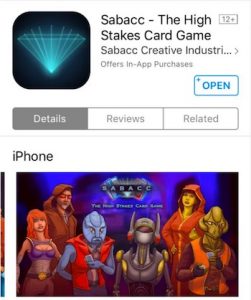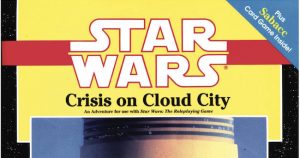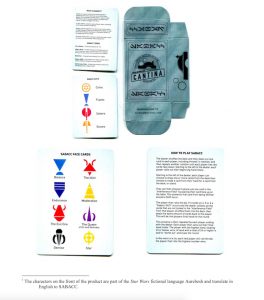 In its latest action in a multi-jurisdictional conflict with a mobile gaming producer, Lucasfilm Ltd. LLC and Lucasfilm Entertainment Company Ltd. LLC filed a complaint for trademark infringement in the Northern District of California on December 21, 2017. The complaint alleges, among other things, trademark infringement against a London-based game developer Ren Ventures Ltd. for using the word SABACC as the name of their iOS and Android mobile game. Other causes of action include copyright infringement, cancellation of the defendant’s trademark, unfair competition, common law trademark infringement, and California unfair competition.
In its latest action in a multi-jurisdictional conflict with a mobile gaming producer, Lucasfilm Ltd. LLC and Lucasfilm Entertainment Company Ltd. LLC filed a complaint for trademark infringement in the Northern District of California on December 21, 2017. The complaint alleges, among other things, trademark infringement against a London-based game developer Ren Ventures Ltd. for using the word SABACC as the name of their iOS and Android mobile game. Other causes of action include copyright infringement, cancellation of the defendant’s trademark, unfair competition, common law trademark infringement, and California unfair competition.
If you’re an avid fan of the Star Wars universe, you may be familiar with Sabacc. It’s a card game which first appeared in a draft screenplay for the The Empire Strikes Back, and later in the 1980 novelization of the same movie. Most prominently, the game of Sabacc appeared in a trio of novels centering around the Star Wars character Lando Calrissian (played by Billy Dee Williams in The Empire Strikes Back and Return of the Jedi). The rules of Sabacc are described in detail in the first of the three novels, a betting game involving a special deck of cards where the goal is to finish with a hand as close as possible to positive or negative 23.
If you are such an avid fan, you may be intrigued to find a mobile game called Sabacc in the Apple AppStore, which gives the player an opportunity to participate directly in the expansive Star Wars universe. The opportunity to play the exact high-stakes card game in which Han Solo won the famous Millennium Falcon spacecraft from Lando Calrissian is simply irresistible to Star Wars fans across the globe. At least this is what Ren Ventures’ business model may have assumed, given the copious amount of visual and oral references to Star Wars in their marketing. For example, this YouTube video published by “Star Wars Explained” and “Sabacc Creative” (also a named defendant) contains the following narration: “…Sabacc Creative, the creators of Sabacc app on iOS and Android. They thought Star Wars fans would be interested in learning how to play Sabacc, and I agreed!”
All of this presents an interesting trademark priority issue: will Lucasfilm be able to establish their prior trademark rights in the term SABACC, the name of a card game which has primarily existed in a fictional galaxy far, far away?
Lucasfilm’s complaint lays a wide factual background in its complaint, emphasizing longevity of use and widespread recognition of the term Sabacc as a designation of a card game. They point to the “decades since the coining of ‘Sabacc’” and their licensees having “used [Sabacc] on or in connection with card games, mobile games, video games, magazines, comic books, novels, television episodes, a live theme park experience, and a major motion picture.” Also referenced are unsolicited media coverages, including a quote from an entertainment website stating that Sabacc is one of the top “fictitious pop-culture games with convoluted rules.”
Notably missing is a claim to a trademark registration for SABACC, as Lucasfilm has not applied for registration of the term SABACC in the United States. As a side note, Lucasfilm has applied for registration of SABACC in Classes 9, 16, 28, and 41 at the EU Intellectual Property Office on April 24, 2017, although the application is currently being opposed by Ren on the basis of Ren’s registered EU trademark for SABACC. Lucasfilm has filed an Application for Invalidity of Ren’s SABACC registration.
The failure of Lucasfilm to secure a US trademark registration for SABACC means they must establish prior trademark rights in SABACC without the presumed validity that registration would have conferred on Lucasfilm. It’s worth mentioning that a prior, successful US filing and registration of SABACC for card games would have went a long way on the issue of priority, avoiding headaches and litigation costs.
US trademark law allows for priority to be established in a number of ways, all of which are based on actual use of the mark in commerce and in connection with a particular good and/or service (this contrasts with EU trademark law, known as a “first to file” jurisdiction, where priority typically goes to the first entity to file an application for trademark registration). Despite the lack of a bright line rule on the use necessary to establish priority, the primary factors courts look at are the quantity of use, the nature of use, the geographic spread of use, and the genuineness of the use for commercial purposes. Small scale use of a mark is acceptable, as the law does not look to commercial success on the priority issue. However, use which is so “small, sporadic, and inconsequential” as to be “de minimus” is insufficient for establishing priority.
Although an answer has not yet been filed at the time of this writing, a parallel proceeding at the Trademark Trial and Appeal Board (TTAB) can shed light onto how defendant Ren may respond in federal court. A mere 2 weeks before Lucasfilm filed the complaint, Ren filed a motion for summary judgment in a cancellation proceeding initiated by Lucasfilm to cancel Ren’s federal registration of the word mark SABACC in Classes 9 and 41. In it Ren poked holes in Lucasfilm’s Petition for Cancellation and raised many questions about Lucasfilm’s purported trademark “use” of the term SABACC.
Perhaps the most interesting trademark issue at stake in both the federal complaint and the Petition for Cancellation is the nature of the use of SABACC. A mark must be used as a source identifier for goods and/or services in order to acquire and maintain protection under trademark law. While it is true that Lucasfilm coined and used the term in a seemingly continuous manner since the late 1970’s, Ren contends in its motion for summary judgment that Lucasfilm’s general mentioning of the SABACC in Star Wars stories does not amount to proper trademark use sufficient to establish priority. Ren argues the law applies equally “with respect to characters and elements of fictional works, i.e.: if a party does not use the characters and elements in a manner that identifies and distinguishes source, then the characters and elements do not function as marks.” Ren directly analyzes Lucasfilm’s alleged trademark use with the trademark use discussed in three TTAB cases which generally support the notion that the mere appearance of fictitious characters referenced in TV shows and advertising material does not afford trademark protection for the names of those characters in connection with those TV shows or the advertised goods and services. Put succinctly by the TTAB in In re D.C. Comics, Inc., 689 F.2d 1042 (CCPA 1982): “[T]he appearance of the JOKER in a story in a BATMAN comic book does not make the JOKER a trademark for the book”. It seems then, the appearance of Sabacc in Star Wars books and movies does not make SABACC a trademark.
However, use of the SABACC mark has not been confined to mere references in Star Wars storylines. Lucasfilm’s complaint presents two pieces of evidence showing use of SABACC in connection with Sabacc playing cards. Page 8 of the complaint shows a Star Wars book with an advertisement on the cover stating “Plus SABACC Card Game Inside!” Appendix A to the complaint shows a picture of a deck of Sabacc cards alongside two individual cards containing the text “What is Sabacc?”, “Sabacc terms”, and “Sabacc suits”. Notably, the literal term SABACC does not appear on the product packaging, rather, Lucasfilm explains the packaging is labeled with characters written in the “Star Wars fictional language Aurebesh [which] translate in English to SABACC.”
Sifting through the evidence in Lucasfilm’s complaint, these two pieces of evidence appear to be the only evidence which could establish classic trademark use. The question remains: is this use sufficient or is it de minimus?
A few of the obstacles I predict defendant Ren will throw in plaintiff Lucasfilm’s way are lack of continuous use of the mark, lack of use of the mark in commerce to identify particular goods and/or services, and a minimal quantity of use. Ren will likely explore the Star Wars book containing the Sabacc card game, published in 1990, investigating the number of books printed and sold, as well as the extent of continuous printing and sales of the book since publication. Ren will likely explore the intent and number of Sabacc playing cards distributed in 2015. A quick internet search revealed that the paying card deck evidence in Lucasfilm complaint was a very limited release of cards intended to be a collector’s item. Assuming Lucasfilm put their best foot forward in the complaint, at first glance there seems to be a difficult road ahead for them – at least as far as infringement of Sabacc is concerned. The Force is strong with the other causes of action.

![[IPWatchdog Logo]](https://ipwatchdog.com/wp-content/themes/IPWatchdog%20-%202023/assets/images/temp/logo-small@2x.png)



![[Advertisement]](https://ipwatchdog.com/wp-content/uploads/2024/04/Patent-Litigation-Masters-2024-sidebar-early-bird-ends-Apr-21-last-chance-700x500-1.jpg)

![[Advertisement]](https://ipwatchdog.com/wp-content/uploads/2021/12/WEBINAR-336-x-280-px.png)
![[Advertisement]](https://ipwatchdog.com/wp-content/uploads/2021/12/2021-Patent-Practice-on-Demand-recorded-Feb-2021-336-x-280.jpg)
![[Advertisement]](https://ipwatchdog.com/wp-content/uploads/2021/12/Ad-4-The-Invent-Patent-System™.png)







Join the Discussion
7 comments so far.
Dan
January 26, 2018 09:31 am@Tom: Until a federal registration is incontestable that registration “shall not preclude another person from proving any legal or equitable defense or defect, including those set forth in subsection (b), which might have been asserted if such mark had not been registered.” 15 U.S.C 1115(a). So at the moment Ren’s registration does not preclude Lucasfilm from asserting its common law right to challenge Ren’s use of a marketplace-confusing mark. Prior common law rights trumps a registration.
Tom
January 26, 2018 05:26 am@Dan: I think Lucasfilm will have a very hard time claiming unfair competition against a company that is using their own registered trademark, as registering a mark is a public declaration of your ownership of the name or symbol. If Lucasfilm had an issue, they should have opposed the registration.
Dan
January 25, 2018 09:39 amWhile prior trademark use must be established to prove infringement and to cancel another’s trademark registration, a rights owner need not assert “trademark” use of the “word, term, name, symbol, or device, or any combination thereof” that’s responsible for the likely marketplace confusion to prevail in a 15 U.S.C. 1125(a)(1)(A) unfair competition claim or under California unfair competition law. I wouldn’t bet against Lucasfilm on those two claims.
Cliff
January 24, 2018 08:17 pmHi Mike and Tom, thank you for reading.
@Mike: I think what Tom is commenting on is the very essence of what a trademark is. You’re right that chess is generic for a type of board game; this is why CHESS would never be attributed trademark rights for the chess game. On the other hand, some games are known by their brand, for example MONOPOLY, UNO, or the inexplicably famous EXPLODING KITTENS.
Perhaps over the course of decades, a game like MONOPOLY could become so widespread and known by the name MONOPOLY that any game with similar rules would be generically referred to as a “monopoly” game. However, until “genericide” happens, MONOPOLY remains a brand protectable under trademark law while “chess” would not be (at least for chess games).
mike
January 24, 2018 11:30 amCould you clarify, Tom? “The name isn’t generic for card games, it is the brand name for one card game among thousands of others”
Chess isn’t generic for all board games either, but it seems it would be generic for one type of board game.
Tom
January 23, 2018 02:51 pmNo, in the same way your can’t challenge “Uno”. The name isn’t generic for card games, it is the brand name for one card game among thousands of others.
Based on what the author has written above, it is pretty clear that Lucasfilm has no rights in the name. Why they choose to try to bully smaller companies (especially when they are likely to lose the case, as here) is beyond me. If, as I suspect, this relates to their movie coming out in May, there is no way this will be decided that quickly, so they will be looking down the barrel of a whole lot of potential infringement liability if they don’t settle.
mike
January 23, 2018 11:32 amIf Lucasfilm is unable to cancel the mark based on their trademark rights in Sabacc, might they not be able to challenge the marks on the basis that it is the generic name for the card game?